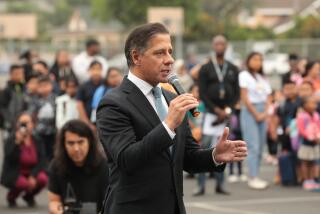Muslim Students Protest Closure
- Share via
ROME — Muslim children took to the sidewalks Monday to protest state authorities’ closing of an Islamic school, an action that has touched off a heated debate over integration of Italy’s fast-growing Muslim immigrant community.
Citing poor sanitary conditions, building code violations and an unauthorized curriculum, Italian officials ordered the school in the northern city of Milan to shut its doors just days before the current semester began earlier this month. Close to 400 children ranging from kindergartners to ninth-graders attended the school, located in a former factory and attached to Milan’s Via Quaranta mosque, which has at times been used by radical Islamic fundamentalists.
Angry parents said that forcing their children to attend public schools, as the state insists, would dilute their identities as Muslims.
The school that was closed followed the Egyptian curriculum and taught primarily in Arabic. “There are parents who want to [eventually] go back to live in Egypt, or parents who do not want to lose their culture, identity and language,” the school’s director, Ali Sharif, said in a telephone interview Monday. “That’s normal, like Italians who go to America.”
Efforts by city and community leaders to find a compromise, including a testy town hall meeting last week, have so far been unsuccessful. In the meantime, the pupils have had no schooling.
On Monday, about 30 children, some of the girls in head scarves, held a symbolic class session widely broadcast by Italian television. The students gathered on a busy Milan sidewalk on Via Quaranta between the school and the mosque. They raised their hands to answer mock questions, and several of their parents told reporters that they felt they were being discriminated against and were considering returning, reluctantly, to their native countries.
The Egyptian-born Sharif, 63, who has lived in Italy for nearly 30 years, said the Islamic committee running the school had been attempting to legalize its status according to state laws that allow non-Catholic religious education. The school had been in operation for at least six years.
But the dispute goes far beyond whether the small, nondescript school was up to code. It reflects the wider debate in Italian society over the role of Muslim immigrants. Many Italians, and some immigrant groups, argue that running an independent Islamic school ghettoizes the children, and can even lead to their radicalization if they are not integrated.
“Islamic children should go to state schools and learn Italian,” Interior Minister Giuseppe Pisanu said in the days after the closure order. “I do not want ghettos. Rather, I want an Italian Islam.”
A leading Roman Catholic newspaper editorialized against the school, which it said had emerged as the “most emblematic icon” of the “Islamic question” in Italy.
“With the stated objective of preserving the culture of the countries that [the immigrants] came from, an impenetrable reality is being allowed to grow ... that can incubate hostile feelings toward a society they will see as impure,” the Avvenire newspaper of the Catholic Bishops’ Conference said. “This will create fertile ground for the manipulation of fundamentalism and terrorism.”
The controversy has taken on a partisan-political dimension as well. Members of right-wing parties such as the Northern League, which are especially strong in the Milan area, have jumped on the bandwagon demanding that the school remain closed.
Muslims constitute Italy’s fastest-growing immigrant population, said to number about 1 million. Most settle in the northern region near Milan, where many work in factories or food production. The percentage of foreign-born students in the province of Milan, 11.6%, is nearly three times the national average, and the overall population of foreign-born students has grown more than sevenfold in the last decade, from 50,000 in 1995 to 360,000 today.
Italy needs foreign workers but is struggling to balance that with domestic security. A small number of alleged Islamic militants have been arrested and put on trial in Italy, and some were deported -- including a well-known radical Moroccan-born imam in the city of Turin, who was expelled Sept. 6 after Italian authorities said he represented a “danger to public security.”
Via Quaranta mosque was also the headquarters of Hassan Osama Nasr, a radical, Egyptian-born cleric better known as Abu Omar, who Italian prosecutors say was kidnapped by CIA agents in 2003 because of his alleged ties to terrorists in Iraq and Europe.
Livia Borghese in The Times’ Rome Bureau contributed to this report.
More to Read
Sign up for Essential California
The most important California stories and recommendations in your inbox every morning.
You may occasionally receive promotional content from the Los Angeles Times.












